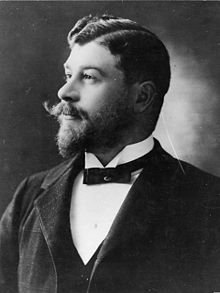Gaetano Trentanove
| Gaetano Trentanove | |
|---|---|
 |
|
| Born | February 21, 1858 |
| Died | March 13, 1937 |
Gaetano Trentanove (February 21, 1858 - March 13, 1937) was an Italian and American sculptor.
Trentanove was born in Florence, Italy, a goldsmith's son. He studied at the Florentine Academy; he was later named honorary scholar of this academy and Parma. Trentanove had an active early career in Italy. He completed Gaddo movente (his first work, awarded a gold medal by the Società Promotrice delle Belle Arti. He completed both a full size statue for his palace and a funereal monument for Count Alfredo Serristori for the cemetery of Figline. He sculpted the sculptural group Tito Vezio e Licena. he sculpted the monument of Signora Fraschetti, placing a crown of flowers on the tomb of her husband in San Miniato. He completed many portrait busts including one of Federigo Campanella. He designed a statue raised on the loggie of the Mercato Nuovo of Florence.
Trentanove opened a studio in Milwaukee, Wisconsin, as a result of friendships made in Paris His initial contact with Milwaukee was made as a student when William E. Cramer, the editor of the Evening Wisconsin, visited Giovanni Dupre's studio, where Trentanove was studying. For the World's Columbian Exposition of 1893, Trentanove sculpted the Otriade or Last of the Spartans, a large white Carrara marble statue. When the Chicago fair closed, Cramer purchased the Spartan statue for the Layton Art Gallery in Milwaukee." Trentanove thus became a regular visitor to Milwaukee and taught classes at the Layton Art Gallery.
Trentanove subsequently acquired American citizenship and although he spent a portion of every year in Florence, where the foundry that cast his models in bronze was located, he passed most of the remainder of his life in Milwaukee. In 1897 Trentanove was created a knight of the Order of the Crown of Italy. After retirement, he returned to Italy where he died.
Trentanove's public monuments are more easily located than his portrait sculptures, figural sculptures and decorative sculpture.
...
Wikipedia
